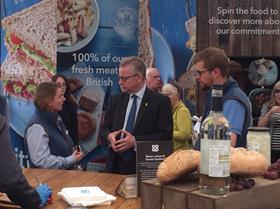
Michael Gove’s promised consultation paper on the future of British agriculture outside the EU was met with mixed response at its launch today.
The Defra secretary of state is proposing to recoup around £150 million from the wealthiest farmers and redistribute it to land users who promote sustainable and environmental food production.
The government’s proposals will see money redirected from direct payments under the Common Agriculture Policy (CAP), which are based on the amount of land farmed, to a new system of paying farmers “public money for public goods” - principally their work to enhance the environment and invest in sustainable food production.
The government has committed to upholding current farm subsidy amounts until 2022, but called the current EU payment scheme as “inefficient and inequitable”.
Gove said at the launch: “We have a historic opportunity to deliver a farming policy which works for the whole industry. Today we are asking for the views of those who will be affected to make sure we get this right so any future schemes reflect the reality of life for famers and food producers.
Yet the president of rural lobby group CLA, Tim Breitmeyer, warned that businesses and landowners should not have to face sudden cuts.
He said: 'The consultation sets out important areas where decisions are needed: how can we manage an effective transition out of the current system, how long should it be? If money is to be removed, how much and from whom? Our message is that in the short term only money that is clearly necessary for transitional measures should be taken out of the system, and no business, no matter how wealthy its owners are perceived to be, should face sudden and dramatic cuts.”
The Food and Drink Federation took a more sanguine stance calling it a “welcome first step”, adding Britain’s supply chain still requires “certainty” on future access to the EU export market.
Its statement read: “Today’s consultation document is a welcome first step, highlighting some of the shared challenges across the food chain - whether that’s how we encourage more science graduates into our sector or boost our exports performance.
“In the immediacy, the ‘farm to fork’ supply chain requires certainty from government, as our latest exports figures show, on future access to raw materials and key EU export markets.”
NFU president Minette Batters underlined her view that profitable, productive and resilient farm businesses are key to delivering the public goods that Gove referred to. “In order to keep delivering for Britain, farm businesses need to be productive, profitable and resilient to volatility,” she explained. “This must be at the forefront of government policy if we are to have a farming sector that feeds us, cares for our countryside and delivers economic benefits.
”While most British farmers would much rather farm without support, what we must be absolutely sure of is a level playing field. British farms cannot compete with other countries’ agricultural goods on the global market if we are disadvantaged. It is vital that we don’t start overhauling parts of the current system which support farmers in providing a healthy and affordable supply of food, without tested and operational alternative programmes and measures in place.”



